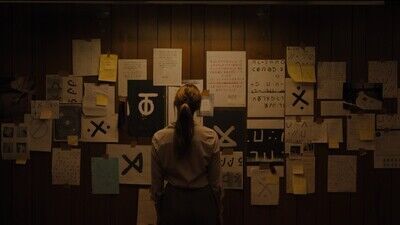Perkins sometimes loses his grip on that fever dream tone, such as in a late-film exposition dump that too directly and bizarrely seeks to explain what’s happened for the previous hour and change. Nightmares don’t need exposition dumps. It might sound nitpicky, but it’s indicative of an overall problem that hampers “Longlegs.” Despite the notable pre-release work by Neon to build buzz, and the incredibly low Cinemascore likely coming its way, this strange film sometimes doesn’t seem willing to commit to its creepy weirdness all the way, pulling back or explaining its intentions when it should be seeking confusion as much as explanation. We remember the nightmares we’re still trying to understand more than anything.
“Longlegs” opens with arguably its most effective sequence, a flashback framed like you’re watching someone’s home movie through a family room projector. A car pulls up to a remote home, from which a young girl emerges. Immediately, Perkins is playing with perspective, not only locking us into the tight frame but basically giving us a child’s POV on the encounter that happens next, one that will impact everything that follows.
Cut to years later, sometime in an exaggerated ‘90s – there’s a photo of Clinton on the wall of the FBI Director’s office to set the time, but a lot of the production design feels even older than that era, once again creating a sort of dream-logic disconnect – where new agent Lee Harker (Maika Monroe) arrives for her first case. Acting on a sort of psychic hunch, she captures a serial killer, leading the FBI to suspect she may not be just another ordinary agent, sending her through a series of mental tests to prove she has unique abilities. Sadly, this thread gets lost a little bit as the film goes on, mostly used to set Lee up as “special,” but Perkins’ screenplay does too little with that aspect of her character. It’s one of several places in which “Longlegs” could have leaned even more into its quirks. Sure, this movie is weird for the multiplexes of America, but my argument would be that it should have been weirder.
One person certainly giving it his weird all is Nicolas Cage (and he has more weird in his bag of acting tricks than most), who plays the title character, a Satan-worshipping serial killer who seems sort of inspired by Ted Bundy and Tiny Tim (the singer, not the urchin). Harker is brought in by Agent Carter (Blair Underwood) to investigate a series of family murders, those horrible events we hear about wherein a parent, usually the father, slays the children and spouse before taking their own life. No one would even think these were anything but tragic, self-contained events if there wasn’t a mysterious figure out there sending cryptic, Zodiac-esque notes about the crimes, tied to specific dates on a calendar. How is Longlegs orchestrating such brutality? And what do the dates mean? Alicia Witt plays Ruth, Lee’s ultra-religious mother, who’s always asking her daughter if she’s said her prayers. One senses Lee is going to need those prayers.

